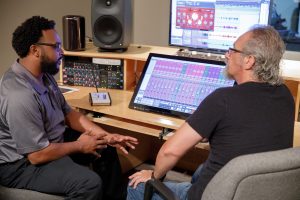
TUSCALOOSA, Ala. — The University of Alabama is now the place where technical engineering skills and musical talent meet.
The musical audio engineering degree, housed in the College of Engineering in collaboration with the School of Music, offers a balance between the two disciplines to prepare students for careers involving technical aspects of music.
“This is a collaboration between two colleges for a degree program. I don’t know that we’ve ever done that on this campus,” said Dr. Tim Haskew, electrical and computer engineering department head.
Students who pursue this degree will learn about recording studio operations, live recording environments, equipment use and the signal processing necessary to become trained audio engineers. Students must take a mixture of foundational engineering courses, like physics, electronics and calculus, as well as traditional music courses, like performance, history and theory, to earn their degrees.
Haskew said the idea is to graduate students who can fully understand how to design, maintain and operate performance and recording equipment and are musically trained to know how technical aspects can be applied in a creative context. He sees this degree path as an opportunity for students who want to be an engineer but also have a passion for the arts.
“It’s all a natural fit really,” Haskew said. “Music is very mathematical. A lot of times you will see folks with a technical background gravitate towards music.”
Charles “Skip” Snead, director of the School of Music, said many Million Dollar Band members are engineering students.
“There are many students on this campus every year that have strengths in both engineering and music,” Snead said. “The opportunity to bring both of these to the table is certainly going to be a very attractive option for a lot of folks.”
Haskew said the engineering portion is what really sets it apart from programs that focus only on the music business. Snead agreed, saying there is more engineering and music in this program compared to other schools. Instead of just learning audio tech and recording skills, he said the graduates from this program will be both professional musicians and engineers.
“To our knowledge, this is the first degree program of its kind in the country that literally has a balance between musical training and engineering, having a full core curriculum between both disciplines,” Snead said.
The program will be capped at 60 students who must audition for the School of Music to be accepted. Most of the courses are already established in the respective departments, and only one new engineering class will be added. The degree requires a total of 126 credit hours.
“Looking at the industry, there are so many opportunities,” Snead said.
He listed community centers, religious organizations, civic centers, television and radio stations and music venues as places were these graduates could find employment. In addition, graduates could also work as consultants and advisers on hardware and software manufacturing.
“We’re really excited to see this program happening. It’s going to be special,” Snead said. “The students that come out with this degree are going to be uniquely trained to be really successful.”
Contact
Alana Norris, engineering communications, 205-348-6444, anorris@eng.ua.edu
Source
Dr. Tim Haskew, thaskew@eng.ua.edu
